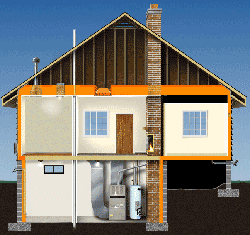Home >>>
Energy >>> Insulation
Insulation
Heat flows naturally from warmer to cooler areas. To maintain comfort, heat lost during the winter must be replaced by the heating system and heat gained during the summer months must be removed by the air conditioning system.
 Why
should you insulate your home?
Why
should you insulate your home?
Up to 70% of energy spent in the average American home is spent on heating and cooling (space conditioning). Insulation makes your home more comfortable and saves money.
By slowing and trapping air, insulation acts as a barrier to keep home temperatures more constant. Heat is "trapped" in air pockets between the fibers of the insulation. The thickness and type of insulation affect the amount of heat that enters your home. Insulation is available in a variety of forms -- batting, blankets, rigid foam board, spray foam,blown-in blanket, and loose-fill -- and each type is designed to fit a particular part of your house.
The easiest and most cost-effective way to insulate your home is to add insulation in the attic. To find out if you have enough insulation, measure the thickness of the insulation. If there is less that 6-7 inches (R-22), you could benefit from adding more.
Insulation is measured in R-values. The higher the R-value, the better the resistance of heat flowing through the insulation over time. The R-value is dependent on the type of material and the thickness. In Florida, it is recommended to have R-30 insulation in the attic, however certain exceptions apply.

